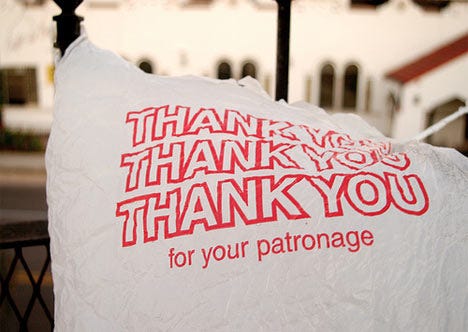We all know about those "unintended consequences" that seem to occur with all those "good" decisions that society makes. It seems that plastic bag bans are no different. Remember the promise of all the cost savings that cities would realize from having to collect plastic bags from the streets, roadsides and beaches in California? Well, it seems that those costs have vanished like the San Francisco fog at noon.
January 29, 2014
We all know about those "unintended consequences" that seem to occur with all those "good" decisions that society makes. It seems that plastic bag bans are no different. Remember the promise of all the cost savings that cities would realize from having to collect plastic bags from the streets, roadsides and beaches in California? Well, it seems that those costs have vanished like the San Francisco fog at noon.
An article published last week in Investor's Business Daily by H. Sterling Burnett, revealed that California's ban of plastic carry-out bags are costing these cities more. Burnett noted that in 2007, "San Francisco became the first city to restrict plastic grocery bags" as the "City Supervisor Ross Mirkarimi claimed that each plastic bag cost the city 17 cents" in litter collection, waste disposal and recycling costs.
 That number didn't exactly prove to be correct, with Burnett noting that "with plastic bags amounting to less than 0.5% of the waste stream and a similarly minuscule amount of landfill space," Burnett calculated the cost to be less than 7.9 cents per bag. San Francisco's household garbage rates increased more than 78.6% from 2005 to 2013, according to Burnett, proving that plastic bag bans are costly - not cost effective.
That number didn't exactly prove to be correct, with Burnett noting that "with plastic bags amounting to less than 0.5% of the waste stream and a similarly minuscule amount of landfill space," Burnett calculated the cost to be less than 7.9 cents per bag. San Francisco's household garbage rates increased more than 78.6% from 2005 to 2013, according to Burnett, proving that plastic bag bans are costly - not cost effective.
Recycling of the plastic bags is extremely high; with 65% of people who were surveyed say they use the bags for trash disposal, pet pickup, and other "re-uses." With recycling bins in most grocery stores, people can takes the plastic bags they don't reuse in some way, back to the story for recycling by companies in the recycling business. (Every time I take plastic bags to the grocery store for recycling, the bin is literally overflowing with returned plastic bags!).
Despite the popularity of plastic bags, the California legislature just reached an agreement that could lead to a state-wide ban in carry-out plastic bags at supermarkets, liquor stores and pharmacies by 2016, said a CBS News report. Los Angeles and nearly 100 other cities and counties in California have enacted bag bans at stores.
Not only does the plastic-bag ban not save these municipalities all the money that proponents of these bans claim it will, the new plastic bag ban legislation calls for using $2 million for loans and grants that could help bag manufacturers retain workers and convert to manufacturing a "new generation of reusable bags with the smallest environmental footprint." However, it doesn't say exactly what that might be: non-woven polypropylene bags? They are also plastic, but would be reusable so are they permitted even though they are still technically "plastic?"
Does California like paper bags better? Perhaps they haven't heard how much water and energy it takes to make paper bags. Of course there are cloth bags, but those also take energy to make and, as we've read in recent reports. Plastic bags require 70% less energy to manufacture than other types of bags. And PlasticsToday has written previously about the residue of germs left in unwashed cloth bags that cause various illnesses.
The plastic bag bans in California have been a proving ground for the fact that such bans don't save money in waste disposal costs, and will ultimately cost the state jobs. As Mark Daniels, chairman of the American Progressive Bag Alliance, an industry association representing plastic bag manufacturers, said in the CBS News report: The plastic bag ban is "another job-killing, big-grocer cash grab masquerading as an environmental bill. Large grocery chains are pushing this bag ban . . . at the expense of their customers."
About the Author(s)
You May Also Like




